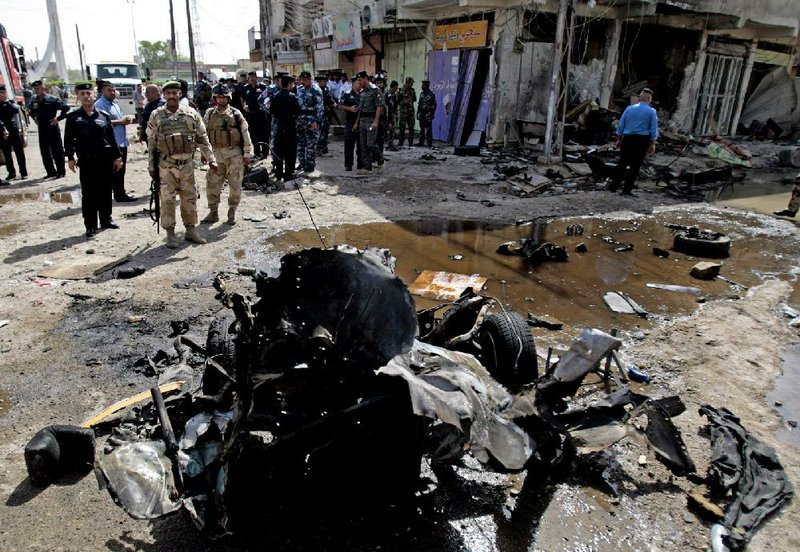BAGHDAD - A blistering string of apparently coordinated bombings and a shooting in 10 communities around Iraq killed at least 51 and wounded dozens Sunday, spreading fear throughout the country in a wave of violence that is raising the prospect of a return to widespread sectarian killing a decade after a U.S.-led invasion.
Violence has spiked sharply in Iraq in recent months, with the death toll rising to levels not seen since 2008. Nearly 2,000 Iraqis have been killed since April, according to the Interior Ministry.
The surge in bloodshed accompanies rising sectarian tensions within Iraq and growing concerns that its unrest is being fanned by the Syrian civil war raging next door.
One of the deadliest attacks came in the evening when a suicide bomber blew himself up inside a cafe packed with young people in the largely Shiite neighborhood of al-Ameen in southeastern Baghdad. The attack killed 11 and wounded 25, according to police.
Clothes-shop owner Saif Hameed, 24, was watching TV at home when he heard the blast nearby. He saw several of the wounded being loaded into ambulances.
“It seems the terrorists are targeting any place they can, no matter what it is,” he said. “The main things for them are to kill as many Iraqis as they can and keep the people living in fear.”
Most of Sunday’s car bombs hit Shiite-majority areas and caused most of the casualties.
No one claimed responsibility for the attacks, but Sunni extremists have stepped up their efforts to undermine the Shiite-led government and to stoke sectarian divisions since the beginning of the year.
The U.S. Embassy condemned the attacks, saying it stands with Iraqis “who seek to live in peace and who reject cowardly acts of terrorism such as this.” The U.S. withdrew its last combat troops from Iraq in December 2011, though a small number remain as an arm of the embassy to provide training and facilitate arms sales.
Sunday’s blasts began with a bomb in a parked car exploding early in the morning in the industrial area of the city of Kut, killing six people and wounding 15 others. That was followed by another car bomb outside the city that targeted construction workers. It killed five and wounded 12, according to police.
In a teahouse hit by one of the blasts, a bloodstained tribal headdress and slippers were strewn on the floor, alongside overturned chairs and couches. Kut is 100 miles southeast of Baghdad.
In the oil-rich city of Basra in southern Iraq, a car bomb exploded on a busy downtown street. As police and rescuers rushed to the scene of the initial blast, a second car exploded. Six people were reported killed. Cleaners were seen sweeping up pieces of the car bomb, which damaged nearby cars and shops.
About an hour later, bombs in parked cars ripped through two neighborhoods in the southern city of Nasiriyah, 200 miles southeast of Baghdad, killing two and wounding 19, police said.
In the Shiite holy city of Najaf, 100 miles south of Baghdad, a blast struck a produce market, killing eight and wounding 28. Watermelons, tomatoes and apples were scattered on the ground. A bulldozer loaded charred and twisted stalls and cars into a waiting truck.
Blasts were also reported in the communities of Hillah, Mahmoudiya and Madain, all south of Baghdad, killing seven total. In the northern city of Tuz Khormato, a roadside bomb targeted a passing police patrol, killing two police officers.
In the northern city of Mosul, four police officers guarding a remote stretch of an oil pipeline were killed and five others were wounded in clashes with unidentified gunmen, a police official said. Mosul, about 225 miles northwest of Baghdad, has been the scene of some of the deadliest unrest outside the Baghdad area in recent weeks.
Medical officials confirmed the casualty figures. Officials spoke on condition of anonymity as they weren’t allowed to release the information to reporters.
The attacks came a day after the leader of al-Qaida’s Iraq arm, known as the Islamic State of Iraq, rejected an order from the terror network’s central command to stop claiming control over the organization’s Syria affiliate, according to a message purportedly from him. Abu Bakr al-Baghdadi also threatened Shiites with more violence.
Al-Baghdadi’s comments reveal his group’s determination to link its own fight against the Shiite-led government in Baghdad with the cause of rebels trying to topple the Iran-backed Syrian regime.
Information for this article was contributed by Sameer N.Yacoub and Adam Schreck of The Associated Press; and by Duraid Adnan and Yasser Ghazi of The New York Times.
Front Section, Pages 1 on 06/17/2013

